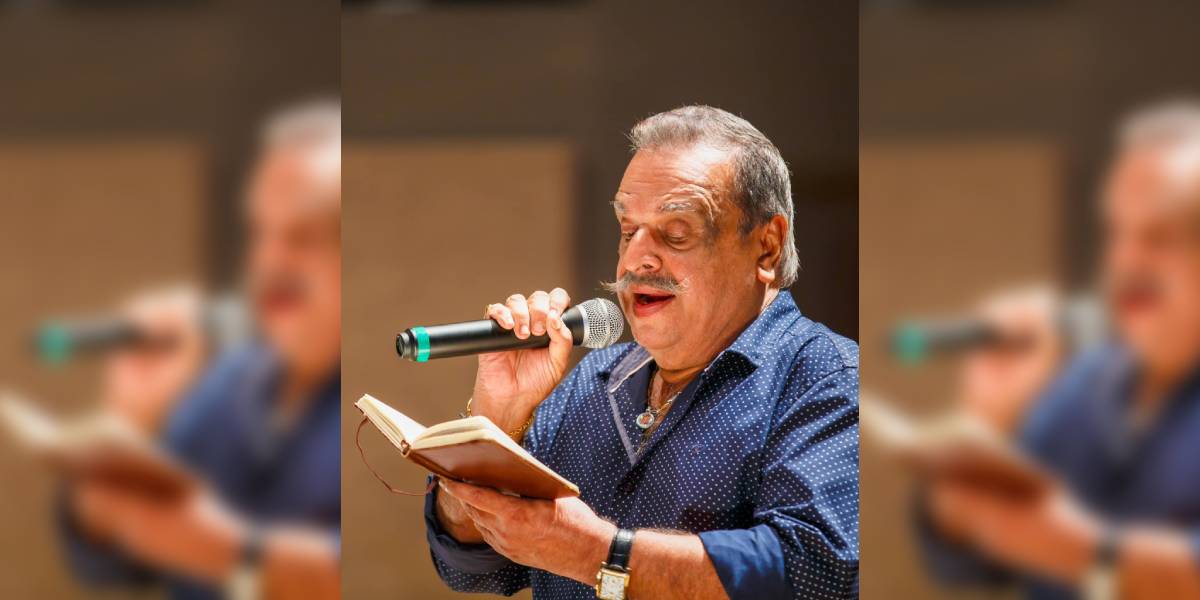He was undergoing treatment for cancer at the Amala Hospital, where he breathed his last around 7.45 pm.
Published Jan 10, 2025 | 8:32 AM ⚊ Updated Jan 10, 2025 | 8:32 AM

P Jayachandran (3 March 1944 to 9 January 2025).
P. Jayachandran, the legendary playback singer whose soulful voice resonated deeply with Malayalis for over six decades, passed away at a private hospital in Thrissur on Thursday, 9 January. He was 80.
He was undergoing treatment for cancer at the Amala Hospital, where he breathed his last around 7.45 pm.
Known as the Bhava Gayakan (singer of emotions), Jayachandran’s voice was synonymous with love, longing, and devotion, and he carved a permanent place in the hearts of music lovers across generations.
He is remembered not just as a singer but as an artist who brought life to lyrics and elevated the emotional depth of every song he rendered.
Also Read: Malayalam’s master storyteller MT Vasudevan Nair passes away at 91
Jayachandran’s career took off in 1965 when he debuted with the song Oru Mullappoomalayumaayi in the film Kunjali Marakkar, penned by P Bhaskaran and composed by Chidambaranath.
However, it was the timeless classic Manjalayil Mungithorthi song from the movie Kalithozhan, composed by G Devarajan, that cemented his place in the Malayalam music industry.
Born on 3 March 1944 at Ravipuram in Ernakulam, Jayachandran studied Zoology at Christ College, Irinjalakuda, and worked briefly as a chemist before his passion for music led him to playback singing.
From there, he never looked back, going on to record over 16,000 songs in Malayalam, Tamil, Telugu, Kannada, and Hindi.
Jayachandran’s unmatched ability to evoke deep emotions earned him numerous accolades, including the National Film Award for Best Male Playback Singer in 1985 and five Kerala State Film Awards.
In 2021, he was honored with the prestigious JC Daniel Award for his lifetime contribution to Malayalam cinema, a recognition of his enduring influence and unmatched legacy in the world of music.
Reflecting on his early career, Jayachandran often credited legendary music director G Devarajan for giving him his first big break.
“Devarajan Master was more than a guru to me; he was like a father figure. I owe my singing career to him,” he once said.
Their collaborations produced numerous evergreen hits that are cherished even today.
Jayachandran’s rise to prominence was particularly remarkable at a time when KJ Yesudas reigned supreme in Malayalam playback singing.
Yet, he succeeded in carving out a niche space for himself, thanks to his distinctive voice and his unparalleled ability to bring depth and emotion to every song.
In addition to his contribution to Malayalam music, Jayachandran was a beloved figure in Tamil cinema, collaborating with celebrated composers like Ilaiyaraaja and AR Rahman.
His soulful voice for Raasathi unna song from Vaidehi Kathirunthal continues to be a must song in the playlists of all music lovers.
His renditions continue to resonate with music lovers, transcending the boundaries of language and time.
Jayachandran is survived by his wife Lalitha, and children, Lekshmi and Dinanath.
On Friday, his body will be taken to his residence at Poonkunnath in Thrissur at 8 am, followed by a public homage at the Kerala Sangeetha Nataka Akademi from 10 am to 12 noon.
He will be laid to rest on Saturday evening (3.30 pm) at his Paliath House in Chendamangalam, Thrissur.
As the world of music mourns the loss of a legend, Jayachandran’s timeless melodies serve as a poignant reminder of his artistry and his ability to touch the hearts of millions.
His legacy as the Bhava Gayakan will continue to echo in the annals of Indian music, ensuring that his voice remains immortal.
Political leaders, artists, and fans have expressed their grief, describing his demise as an irreplaceable loss to the world of music.
Chief Minister Pinarayi Vijayan described Jayachandran’s departure as the end of a timeless musical era.
“Jayachandran was a singer who lived in the hearts of Malayalis, South Indians, and the entire country. His unparalleled emotional expression set him apart, and his contributions brought the art of singing closer to the common man. The world recognized the melodious beauty of the Malayalam language through his voice,” he said, calling the loss irreparable for the Malayalam music and film industries.
Governor Rajendra Vishwanath Arlekar also paid tribute, highlighting the singer’s enduring appeal.
“His endearing voice, which captivated audiences for over six decades, will continue to soothe hearts for generations. May his soul attain Mukti,” the Governor remarked.
Leader of the Opposition VD Satheesan lauded Jayachandran’s ability to transcend time through his melodies.
“His voice resonates with generations of Malayalis, embodying an ageless sweetness that continues to captivate. His songs, filled with the ever-changing seasons of music, remain cherished memories for all,” Satheesan noted.
CPI(M) State Secretary MV Govindan remembered Jayachandran as an artist who transcended linguistic boundaries, enchanting listeners in Tamil, Kannada, Hindi, and Telugu.
“He immortalized love and longing with his soulful voice, earning numerous state and national awards. His music will live on, sung by generations to come,” Govindan said, extending his condolences to the singer’s family and fans.
Congress Working Committee member Ramesh Chennithala called Jayachandran’s demise an irreplaceable loss for Malayalis worldwide. Recalling their long personal association, he said,
“Jayachandran’s natural talent shone brightly, even without formal classical training. His music, like the moonlit nights of Dhanu Masa, will forever illuminate our memories.”
He specifically referenced Jayachandran’s iconic song Manjalayil Mungithorthi to highlight the singer’s lasting impact.
The legendary singer, whose career spanned more than six decades, will be remembered for his ability to infuse emotion into every song he performed—whether film songs, devotional hymns, or independent tracks.
As the curtain falls on this maestro’s life, his songs remain immortal, continuing to inspire and soothe generations to come.
(Edited by Majnu Babu).
